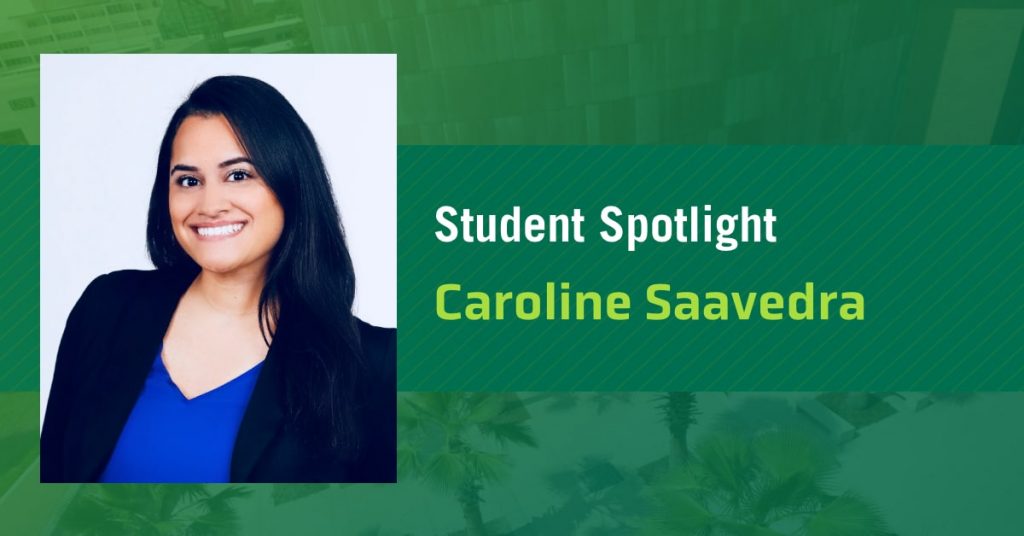Choosing a Master of Science in Health Informatics from the University of South Florida wasn’t difficult for Caroline Saavedra after graduating with her undergraduate degree from USF. But it was based on a lot more than loyalty to her alma mater.
Reputation, familiarity and convenience of an online program certainly played their part in attracting Saavedra to USF, but in the end, it was the university’s approach to training health IT professionals that convinced her.
Why USF?
“I found that other universities that offer a similar program did so via their college of business or information technology,” Saavedra said. “This was simply not the educational perspective I was looking for. I appreciate that the Morsani College of Medicine has taken the time to select instructors who are trained clinicians or IT professionals with experience working in clinical settings. This has given me a holistic perspective of the field, its current challenges, and potential solutions that I had not considered to prior to this program.”
Saavedra, of Tampa, Florida, works as a Project Manager for healthcare technology implementations. She’s been in health IT for about eight years, starting as a Technical Applications Analyst working on commercial EHRs. Over the years, Saavedra has taken on a number of different roles that have provided her with a variety of perspectives on process, which led her to pursue a Project Management Professional certification.
Well-versed in the technical aspects of the industry, Saavedra wondered what more she could do to bridge the gap between her technical and clinical understanding of the field.
“I felt as though I needed more specific, detailed knowledge of how technology could help address some of the challenges within healthcare,” Saavedra said. “I held off graduate school until I felt confident that I had found the right program to further my education. This program gave me the opportunity to obtain the highest level of education in the field. It was one of the best decisions I ever made. I found that the curriculum was very well thought out and innovative. The program truly prepares and equips its students with the knowledge and skills they need in order to meet healthcare challenges head-on.”
Saavedra is an avid traveler, having visited countries such as Peru, Costa Rica, Greece, Puerto Rico, and other areas of the Caribbean. She’s looking forward to eventually checking off a bucket list trip to Egypt, but she’ll have to squeeze it in between her travels for work. Looking back, her travels are another reason she’s grown fond of her experience with USF’s online MS in Health Informatics program.
“Another factor that attracted me to the program is that it’s entirely online,” Saavedra said. “As an industry professional, being able to continue my education regardless of whether I am home, on an airplane or in a hotel room has been extremely helpful.”
Interview with Caroline Saavedra
We asked Caroline a range of questions regarding health informatics, her experience as a program assistant for HIMSS19 and her work as a tech blogger. Check out the rest of Caroline’s interview below.
Q: What are some developments in the world of health IT that excite you, and what do you think will have the biggest impact on your work?
A: Some trends I find very exciting and am looking forward to seeing how they develop over time are the efforts with predictive analytics and artificial intelligence. I truly believe predictive analytics will have a great impact on the delivery of care. I am also excited to see how AI will play a role in the future of clinical decision support systems.
Q: You’ve developed a blog for women working, or aspiring to work, in the tech space. Tell us a bit more about how you got started writing the blog. Have you always wanted to write, or is this something you’ve done to support your career?
A: My Tekwomen.com blog was something I had always wanted to do but never had the courage. The tech space has been, and to a certain extent, continues to be a male-dominated field. When I reflect on my career, I always think about how I would have appreciated having a female mentor, a support group or just a space where I felt supported to continue to pursue my interests and obtain the information, advice and motivation I needed. After overcoming the fear of putting myself out there, I decided to go ahead and create that space for women who are interested in tech. Times are changing and more women are beginning to pursue their passions. I’ve had many women tell me how much they love the fact that I have developed the blog! I do it for them.
Q: One of the questions you ask people on the blog is about the message they would give aspiring females in the tech industry. So we have to ask, what message would you give them?
A: Your input matters. You have a voice. Use it!
Q: You attended HIMSS19 in Orlando where you worked as a program assistant. Was that your first HIMSS conference? What was your favorite part?
A: Although it was not my first HIMSS conference, it was my first time working as a program assistant. I find it difficult to identify one particular part of the conference as my favorite, but a few events I loved were the Women in Health IT Reception, the Career Fair and the opportunity to network with so many great people within the industry.
Q: We encourage our students to take advantage of the opportunities that HIMSS offers. What would you say your biggest takeaway from the show was and what value does it present for students in your opinion?
A: The education sessions and forums are wonderful opportunities for students to gain insight on how different organizations and individuals are tackling real-world HIT challenges. I would encourage students to take advantage of these sessions and the wealth of knowledge they provide.
Q: Were there any sessions at HIMSS19 that provided knowledge you can use in your work?
A: Absolutely! There were a couple of sessions that I found extremely useful as a project manager:
- Project Management: Prioritizing, Managing and Controlling Your Project and Application Portfolios
- Clinical Informatics in the Age of FHIR: How API-Based Technologies are Transforming Healthcare
- Data & Cloud Infrastructure: Building Blocks for Healthcare Transformation
Q: What role do you see educators like USF playing in an industry that is so quickly evolving and growing in importance?
A: USF Health has created a truly amazing opportunity for health IT professionals to get the education they need in order to bridge the gap between technology and healthcare. They are preparing our next generation of HIT Champions with the education and skills they need to help drive solutions to the challenges we face today.



